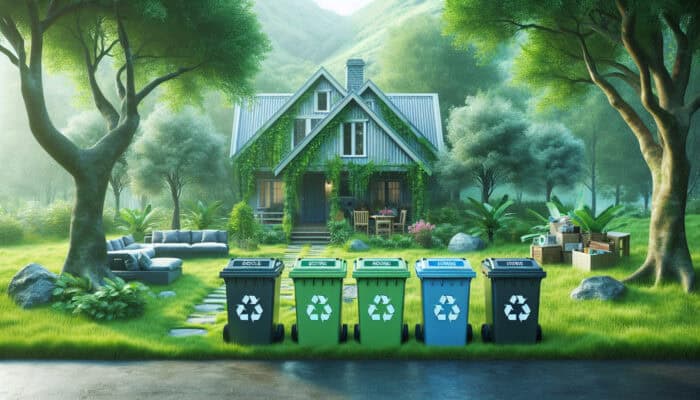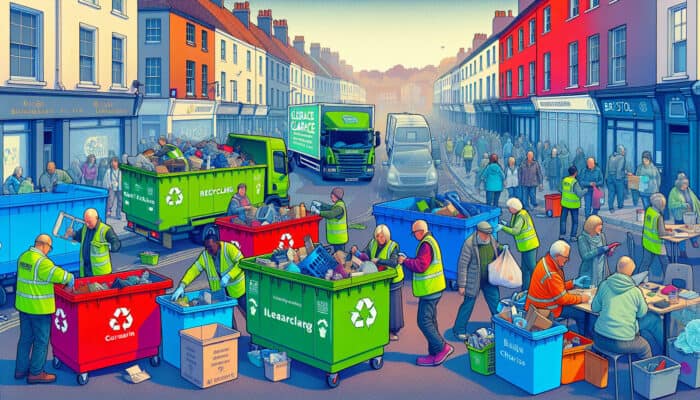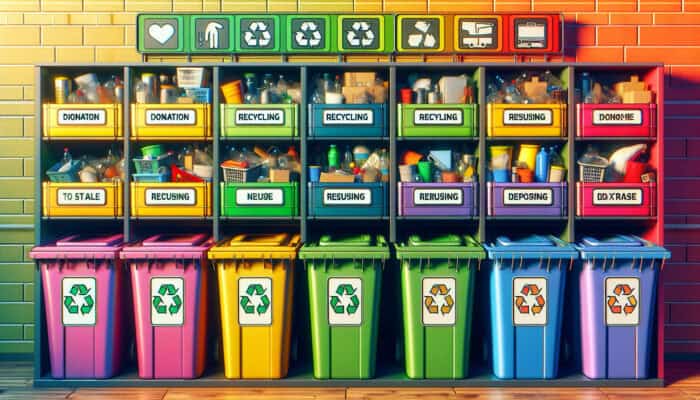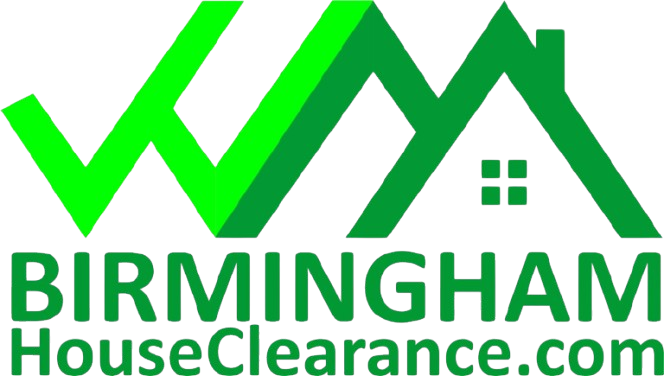Introduction to Eco-Friendly House Clearance in Bristol
What is Eco-Friendly House Clearance?

Bristol House Clearance: Eco-friendly house clearance is a conscientious approach that prioritises sustainable practices to minimise waste and environmental impact during the clearing process. This method focuses on reusing, recycling, and donating items that are no longer needed, rather than simply discarding them. By adopting eco-friendly clearance methods, households can play a vital role in preserving the environment while decluttering their living spaces. Key principles of eco-friendly clearance include:
- Reduce: Minimise the amount of waste generated during the clearance process.
- Reuse: Find new uses for items instead of discarding them.
- Recycle: Properly dispose of recyclable materials to ensure they are processed correctly and efficiently.
- Donate: Give usable items to charities or those in need.
- Compost: Convert organic waste into nutrient-rich compost for gardens.
- Educate: Inform yourself and others about sustainable practices and their importance.
Benefits of Eco-Friendly Clearance in Bristol
Engaging in eco-friendly clearance practices offers numerous benefits for both individuals and the community in Bristol. By reducing landfill waste, these practices contribute to a healthier environment, promoting sustainability and fostering a sense of responsibility towards our shared resources. Additionally, eco-friendly clearance can be cost-effective, particularly when considering the savings from reduced disposal fees and the potential for selling reusable items. The environmental benefits of adopting eco-friendly clearance methods include:
- Less landfill waste: Minimising the volume of rubbish sent to landfills reduces harmful emissions.
- Lower carbon footprint: Sustainable disposal methods decrease greenhouse gas emissions.
- Support for local charities: Donations of usable items help those in need and strengthen community ties.
- Resource conservation: Recycling and reusing items conserve natural resources and raw materials, thereby reducing the need for new production.
- Improved community well-being: Encouraging sustainable practices fosters a sense of community and responsibility.
How to Start Your Eco-Friendly Clearance Journey
Embarking on an eco-friendly clearance journey begins with assessing the items in your home and making intentional choices that contribute to a reduced environmental footprint. Planning your clearance effectively is crucial for achieving your sustainability goals. Here are some initial steps to consider when starting your eco-friendly clearance:
- Assess your belongings: Evaluate the items you truly need and those that can be discarded.
- Plan your clearance: Set a timeline and create a detailed plan for the process.
- Choose eco-friendly options: Research local services that prioritise sustainable practices in their operations.
- Engage family members: Involve everyone in your household to make the process collaborative and enjoyable.
- Set clear goals: Determine what you would like to achieve by the end of your clearance.
Local Eco-Friendly Clearance Services in Bristol

Bristol is home to various companies that specialise in eco-friendly clearance, offering services tailored to your needs while prioritising sustainability. These businesses focus on reducing waste and ensuring that as many items as possible are reused, recycled, or donated for reuse. When selecting an eco-friendly clearance service, consider their track record, customer reviews, and the specific services they provide. Reputable companies often partner with local charities, ensuring that usable items are put to good use and supporting community welfare.
Case Studies of Successful Eco-Friendly Clearances in Bristol
Examining real-life examples of successful eco-friendly house clearances in Bristol offers invaluable insights into effective practices and their positive effects on the environment. One notable case involved a family that undertook a comprehensive house clearance, systematically sorting through their belongings and donating a substantial portion of usable items to local charities. The process not only freed up much-needed space in their home but also raised awareness about the importance of sustainability within their community. The successful outcomes of such clearances demonstrate that eco-friendly practices can lead to more significant environmental benefits, inspiring others to follow suit.
Sorting and Categorising Items for Eco-Friendly Disposal
How to Sort Items for Maximum Reuse?

Effective sorting is essential for maximising reuse and ensuring that as many items as possible are kept out of landfills. When sorting, it is helpful to create clear categories, enabling you to streamline the process. Common categories include ‘donate’, ‘recycle’, ‘reuse’, and ‘dispose’. By using these categories, you can ensure that items are sorted correctly and efficiently, making the entire clearance process smoother and more streamlined. Techniques for ensuring proper sorting include:
- Label bins: Use clearly marked bins for different categories to avoid confusion.
- Establish criteria: Set clear guidelines for what qualifies for donation versus recycling.
- Involve family members: Engage others in the sorting process to make it more efficient and effective.
- Take breaks: Regular breaks can help maintain focus and energy during sorting sessions.
What Items Can Be Recycled in Bristol?
In Bristol, a wide range of items can be recycled, including electronics, paper, plastics, textiles, and specific types of household waste. Knowing what can be recycled helps you make informed decisions during your clearance process, ensuring that materials are disposed of responsibly. Local recycling facilities play a crucial role in this process by providing residents with accessible options. Some of the specific items accepted for recycling include:
- Paper and cardboard: Ensure it is clean and free of contaminants before recycling.
- Plastics: Look for recyclable symbols on packaging.
- Glass containers: Rinse bottles and jars thoroughly to remove any residue.
- Electronics: Many places accept old electronics for recycling to prevent toxic waste from being released into the environment.
- Textiles: Unwanted clothing can often be recycled or donated for reuse.
Tips for Categorising Items Efficiently
Efficient categorisation of items is a crucial aspect of the clearance process that can significantly enhance its effectiveness. To streamline your efforts, utilise clear labels and bins for each category, which will help prevent confusion and make the sorting process more manageable. Consider implementing the following tools and strategies for optimal categorisation:
- Use colour-coded labels: Assign colours to different categories for quick visual identification.
- Invest in storage bins: Use sturdy, stackable bins to separate and store items in a logical manner.
- Create a checklist: Develop a checklist for what should be included in each category.
- Regularly review sorted items: Periodically check sorted items to ensure they remain categorised correctly.
Expert Insights on Bristol House Clearance: Eco-Friendly Tips
Include real-world examples of successful eco-friendly clearances in Bristol
Real-world examples of successful eco-friendly clearances in Bristol provide essential insights into practical implementation. For instance, a community initiative for clearing out shared spaces in flats demonstrated the effectiveness of collective action. Residents worked together to sort through communal storage areas, identifying items for recycling, donation, or reuse. The success of this initiative hinged on clear communication and a shared commitment to sustainability, inspiring other communities to engage in similar efforts. Such examples illustrate how grassroots movements can foster environmental awareness and community spirit, resulting in successful eco-friendly clearances.
Provide actionable steps for implementing eco-friendly clearance.
To effectively implement eco-friendly clearance, individuals can follow several actionable steps designed to make the process manageable and highly effective. Begin by hiring eco-friendly clearance services that prioritise sustainable practices and understand your specific needs. Setting up a recycling station in your home can also streamline the process and encourage responsible disposal of materials. Additionally, planning the clearance in manageable phases, rather than overwhelming yourself with the entire process at once, allows for better focus and effectiveness. Tailoring these steps to your individual circumstances will enhance the overall experience and outcomes.
Offer expert analysis on the impact of eco-friendly clearance.e
The impact of eco-friendly clearance extends beyond individual households, significantly reducing environmental harm and supporting local economies. Sustainability experts emphasise that adopting such practices leads to a decrease in landfill waste, conserves natural resources, and reduces greenhouse gas emissions in the long term. Furthermore, by facilitating donations, eco-friendly clearances bolster the local economy and promote responsible consumerism. The long-term benefits of these practices encompass improved community health, sustainable resource management, and heightened awareness of environmental responsibility among residents.
Discuss the role of community involvement in eco-friendly cleaning.ce
Community involvement plays a pivotal role in enhancing the effectiveness of eco-friendly clearance efforts. When communities come together, they can share resources, knowledge, and motivation, resulting in a more significant collective impact. Successful initiatives often involve local organisations that facilitate community clean-up events, workshops, or awareness campaigns that encourage participation. Motivating communities to engage can be achieved through effective communication, highlighting the tangible benefits of eco-friendly practices, and fostering a sense of shared responsibility. Building community networks around sustainability can inspire individuals to take action, amplifying the impact of eco-friendly clearances.
Donating and Reusing Items in Bristol
Where to Donate Items in Bristol?
Bristol boasts numerous charities and organisations that welcome donations of various items, including furniture, clothing, and household goods. Donating helps reduce waste while simultaneously supporting local communities and those in need. Some of the best places to donate include charity shops, community centres, and specific organisations focused on specific causes, such as homelessness or environmental sustainability. Engaging with these local charities not only helps those in your community but also promotes a culture of giving and resourcefulness.
- Oxfam: Known for accepting a wide range of goods, including clothing and household items.
- St. Peter’s Hospice: Accepts donations of furniture and bric-a-brac to support palliative care.
- The Furniture Recycling Project: Focuses on rehoming unwanted furniture to help those in need.
- Emmaus Bristol: Provides support to homeless individuals by selling donated items.
How Can You Reuse Items Effectively?
Reusing items effectively can be as straightforward as repurposing furniture or finding innovative uses for everyday objects. For instance, old jars can be repurposed as storage containers for small items, while worn-out furniture can be creatively restored or repurposed for new purposes. The key to effective reuse lies in a combination of creativity and practicality, enabling you to extend the life of your belongings. By identifying the potential for repurposing, you can actively contribute to reducing waste and promoting sustainability.
- Turn old furniture into planters: Wooden crates or tables can serve as unique garden features.
- Use glass jars for storage: Perfect for organising craft supplies, kitchen items, or small tools.
- Repurpose clothing: Convert old t-shirts into reusable shopping bags or cleaning rags.
- Transform pallets: Use wooden pallets to create outdoor furniture or garden beds.
Benefits of Donating and Reusing in Bristol
The benefits of donating and reusing items are multifaceted, positively impacting both the environment and the community. By donating, you can help reduce waste, allowing usable items to be given a second life rather than ending up in landfills. Supporting local charities fosters a sense of community and provides essential resources for those in need. Additionally, reusing items promotes a sustainable lifestyle, encouraging others to consider their consumption habits and the value of resources. The social benefits of these practices include strengthened community ties and enhanced environmental awareness among residents.
Recycling Options and Facilities in Bristol
What Can Be Recycled at Bristol Recycling Centres?
Bristol’s recycling centres offer a diverse range of materials for recycling, including electronics, batteries, garden waste, and various household items. Understanding what can be recycled is crucial for making eco-friendly decisions during your clearance. Some specific items accepted at these facilities include:
- Cardboard: Must be clean and flattened before disposal.
- Plastics: Check for recycling symbols to confirm eligibility.
- Metals: Aluminium and steel cans are widely accepted for recycling.
- Electronics: Devices such as computers and TVs can be processed to recover valuable materials.
How to Use Bristol’s Recycling Facilities Efficiently?
Using Bristol’s recycling facilities efficiently requires understanding their guidelines, schedules, and the types of materials accepted. Preparation is key; ensure that items are clean and sorted correctly before heading to the recycling centre. Please familiarise yourself with the specific regulations for each facility, as they may differ in terms of accepted materials and operational hours. Best practices for utilising these facilities include:
- Check opening hours: Verify when facilities are open to avoid wasted trips.
- Sort materials beforehand: Make sure items are categorised and ready for disposal.
- Follow guidelines: Adhere to facility instructions for recycling to ensure compliance.
- Be patient: Busy periods can lead to longer wait times, so plan accordingly.
Benefits of Using Local Recycling Facilities
Utilising local recycling facilities has numerous benefits that extend beyond mere convenience. By recycling locally, residents can significantly reduce transportation emissions, contributing to a lower overall carbon footprint. Supporting these facilities also bolsters the local economy, as they often employ local community members and source materials from within the region. Environmentally, using local recycling options ensures that waste is managed sustainably, reducing the strain on landfills. The overall impact of using these facilities is a healthier environment, a more robust local economy, and a greater sense of community responsibility towards sustainable living.
Research-Backed Benefits of Bristol House Clearance: Eco-Friendly Tips
Include research on the environmental impact of eco-friendly clearance.
Research indicates that eco-friendly clearance methods significantly reduce landfill waste and greenhouse gas emissions. By prioritising recycling and donation over disposal, households contribute to a sustainable future and resource conservation. Studies have shown that communities that actively engage in eco-friendly clearances can reduce their overall waste output while raising awareness about the importance of sustainable practices. Specific studies highlight a positive correlation between community involvement in eco-friendly efforts and improved environmental outcomes, reinforcing the need to adopt such practices.
Provide data on the economic benefits of eco-friendly clearance.
Engaging in eco-friendly clearance can yield substantial economic benefits for individuals and communities. Data indicates that by reducing disposal fees and selling reusable items, households can save money while also contributing to sustainability. Additionally, local charities that benefit from donations often reinvest in their communities, fostering economic growth and providing essential services. Economic studies suggest that eco-friendly clearance practices not only enable financial savings but also promote a more circular economy, benefiting all stakeholders involved.
Offer expert analysis on the social benefits of eco-friendly clearance.e
Experts highlight that eco-friendly clearance practices provide significant social benefits by supporting local charities and fostering community engagement. When individuals donate items, they contribute to a culture of sharing and resourcefulness that strengthens community ties. Furthermore, eco-friendly clearances promote awareness of environmental issues, encouraging residents to take responsibility for their impact on the planet. The most significant social impacts include enhanced community cohesion and a collective commitment to sustainability, creating a more resilient and supportive environment for all residents.
Discuss the health benefits of eco-friendly cleaning.ce
Adopting eco-friendly clearance practices can lead to improved health outcomes by enhancing air quality and reducing exposure to harmful chemicals. Proper disposal of hazardous materials and the reduction of landfill waste contribute to cleaner environments, which directly benefit respiratory health and overall well-being. Studies have linked eco-friendly practices to lower instances of pollution-related health issues, underscoring the connection between environmental sustainability and public health. The health improvements associated with these practices emphasise the importance of making environmentally conscious decisions during house clearances.
Eco-Friendly Clearance Services in Bristol
How to Choose the Right Eco-Friendly Clearance Service?
Selecting the right eco-friendly clearance service is crucial for ensuring a sustainable and effective clearance process. Begin by researching the company’s eco-friendly credentials, such as their recycling methods and partnerships with local charities. Reading customer reviews can provide insight into their reliability and effectiveness. It is also essential to understand their disposal methods to ensure they align with your sustainability goals. Key criteria for selecting a suitable service include:
- Transparency: Look for companies that openly share their practices and environmental impact.
- Certifications: Verify any eco-friendly certifications or endorsements.
- Local involvement: Choose services that support local charities and community initiatives.
- Customer feedback: Pay attention to reviews and testimonials from previous clients.
What Services Do Eco-Friendly Clearance Companies Offer?
Eco-friendly clearance companies in Bristol offer a variety of services designed to support sustainable practices during the clearance process. These services typically include furniture removal, coordination of recycling, and facilitation of donations, ensuring that items are disposed of responsibly. Many companies also provide additional services such as packing and unpacking, as well as sorting and categorising items to streamline the process. By focusing on sustainable practices throughout the clearance process, these companies help reduce waste and promote a more eco-friendly approach to house clearances.
Benefits of Hiring Professional Eco-Friendly Clearance Services
Hiring professional eco-friendly clearance services brings numerous advantages, particularly for those looking to minimise their environmental impact during the clearance process. These services are equipped to handle the clearance efficiently, ensuring that items are disposed of correctly and sustainably. Additionally, many eco-friendly clearance companies have established partnerships with local charities, facilitating donations of usable items and helping those in need. The key advantages of using professional services include:
- Expertise: Trained professionals understand sustainable disposal methods and practices.
- Time-saving: Delegating the clearance process frees up your time for other priorities.
- Peace of mind: Knowing that your items are being handled responsibly alleviates concerns about waste and environmental impact.
- Community impact: Supporting local charities and organisations through donations enhances your contribution.
Sustainable Practices for Bristol House Clearance
What Sustainable Practices Can You Implement During Clearance?
Implementing sustainable practices during the clearance process is essential for minimising environmental impact. Key practices include using reusable containers for packing items, hiring eco-friendly services that prioritise sustainability, and planning to donate or recycle items rather than disposing of them. Integrating these practices into your clearance plan can significantly enhance its sustainability. For example, consider the following sustainable practices:
- Plan: Develop a detailed plan that includes sustainable disposal strategies to ensure effective waste management.
- Use eco-friendly packing materials: Opt for biodegradable packing materials over plastic.
- Engage local services: Seek out eco-friendly clearance companies in Bristol.
- Educate yourself: Learn about local recycling options and donation opportunities in your area.
How to Reduce Waste During Bristol House Clearance?
Effectively reducing waste during a house clearance involves careful planning and execution. Start by sorting items into categories that focus on reuse, recycling, and donation to avoid unnecessary disposal. Avoid using single-use packaging materials, as they contribute significantly to waste generation. Additionally, planning your clearance in phases allows for better management and reduces the likelihood of waste. Strategies to help minimise waste include:
- Emphasise reusability: Find ways to repurpose items rather than disposing of them.
- Limit single-use items: Opt for reusable containers instead of disposable alternatives.
- Encourage donations: Actively seek out local charities that accept items.
- Research recycling options: Familiarise yourself with what can be recycled in Bristol.
Benefits of Adopting Sustainable Practices in Bristol
Adopting sustainable practices during the clearance process has far-reaching benefits for both individuals and the environment. By reducing your environmental impact, you contribute to healthier ecosystems and a cleaner community. Supporting local economies through donations also fosters a sense of community engagement and responsibility. Long-term benefits include enhanced community ties, reduced waste, and a collective commitment to sustainability that can inspire others to adopt similar practices. Making responsible choices today can lead to a healthier planet for future generations.
Conclusion and Next Steps for Eco-Friendly Clearance in Bristol
How to Plan Your Next Eco-Friendly Clearance?
Planning an eco-friendly clearance requires careful consideration and a structured approach. Begin by assessing your items and determining which are suitable for donation, recycling, or disposal. Choosing the right services plays a crucial role in ensuring sustainability, so research local eco-friendly clearance companies that align with your values. Establish a timeline for the clearance process and set clear goals to keep you motivated. Important steps to plan effectively include:
- Conduct a thorough inventory: List all items and categorise them for easier sorting.
- Set a timeline: Allocate specific days for sorting, packing, and disposal.
- Research local services: Identify eco-friendly clearance and recycling options in your area.
- Engage family members: Involve everyone in the planning and execution for a collaborative effort.
What Resources Are Available for Eco-Friendly Clearance in Bristol?
Bristol offers an array of resources to support eco-friendly clearance efforts, including local recycling centres, charitable organisations, and eco-friendly clearance companies. These facilities play a crucial role in promoting sustainability by providing accessible options for residents looking to minimise their waste. Engaging with these resources not only facilitates the clearance process but also promotes a culture of environmental responsibility within the community. By availing yourself of these options, you can make a significant impact on both your household and the broader Bristol community.
FAQs
What is eco-friendly house clearance?
Eco-friendly house clearance involves sustainable practices such as reusing, recycling, and donating items to minimise waste and environmental impact during the clearing process.
Why is eco-friendly clearance important?
Eco-friendly clearance helps reduce landfill waste, supports local charities, and promotes sustainability, contributing to a healthier environment and community.
How do I start an eco-friendly house clearance?
Begin by assessing your belongings, planning the clearance process, and selecting the most eco-friendly services to minimise environmental impact.
Where can I donate items in Bristol?
Bristol has several charities accepting donations, including Oxfam, St. Peter’s Hospice, and The Furniture Recycling Project, which help reduce waste while supporting those in need.
What items can be recycled in Bristol?
Recyclable items in Bristol include paper, plastics, electronics, batteries, and textiles, among others, available for drop-off at local recycling centres.
How can I effectively reuse items?
Reusing items can involve creatively repurposing furniture, using containers for storage, or transforming old clothing into new products, extending the life of your belongings.
What are the benefits of donating items?
Donating items helps reduce waste, supports local charities, and fosters a sense of community, providing essential resources for those in need.
How do I choose an eco-friendly clearance service?
Select an eco-friendly clearance service by checking their credentials, reading customer reviews, and confirming that they use sustainable disposal methods.
What are some sustainable practices for house clearance?
Sustainable practices include using reusable containers, planning for donations and recycling, and educating yourself on local recycling options to minimise waste.
What health benefits are associated with eco-friendly clearance?
Eco-friendly clearance practices can lead to improved air quality, reduced exposure to harmful chemicals, and better overall health and well-being for individuals and communities.






